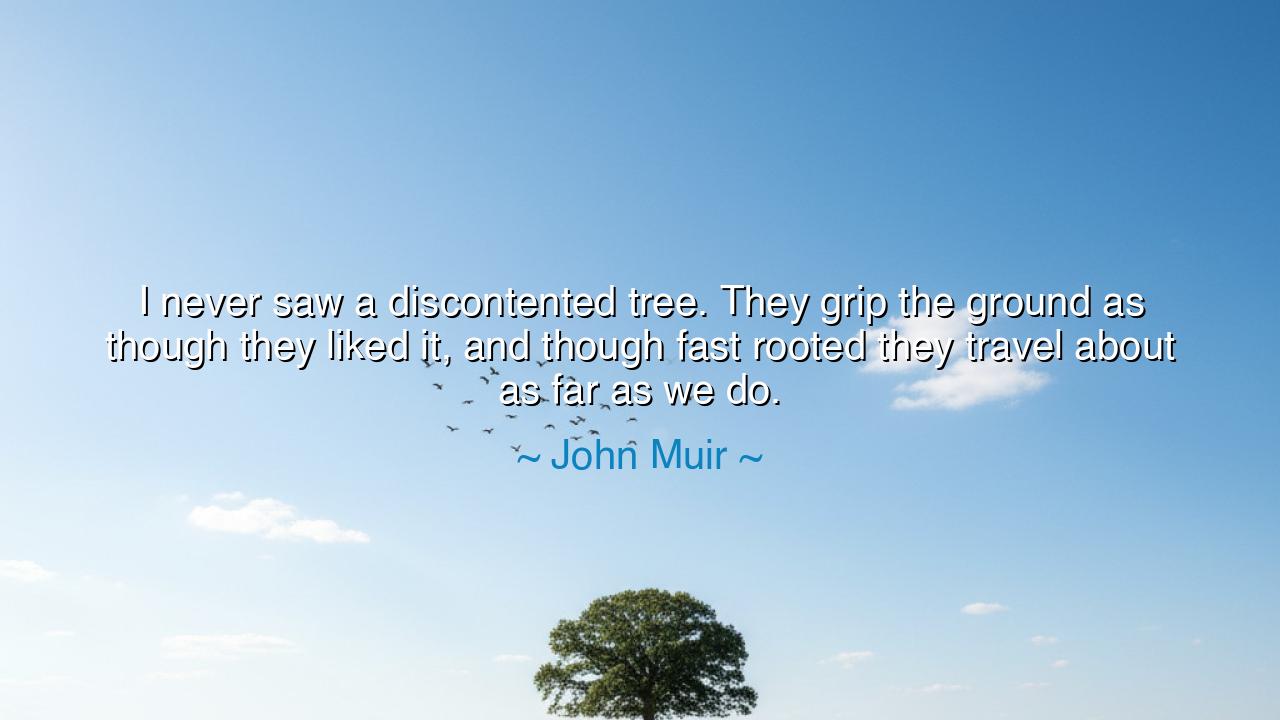
I never saw a discontented tree. They grip the ground as though
I never saw a discontented tree. They grip the ground as though they liked it, and though fast rooted they travel about as far as we do.






John Muir, prophet of the wilderness and lover of mountains, once wrote: “I never saw a discontented tree. They grip the ground as though they liked it, and though fast rooted they travel about as far as we do.” In these words is not only the keen eye of a naturalist but the soul of a philosopher. For Muir saw in the trees not only forms of bark and branch, but lessons for mankind. The tree, silent yet steadfast, never complains of its place. It accepts its station in the earth with quiet joy, gripping the soil not as a prisoner but as one at home. And though it does not march like armies, nor wander like nomads, it journeys in its own way — rising skyward, spreading branches, carrying seeds, living a life of movement while appearing still.
The ancients also saw wisdom in the tree. The oak was a symbol of Zeus; the ash, Yggdrasil, was the world-tree of the Norse; the Bodhi tree gave enlightenment to the Buddha. Always the tree has stood as a sign of endurance, patience, and secret vitality. Muir joins this lineage of seers, declaring that the tree, though rooted, travels as far as man. For while we walk across the earth, the tree ascends toward heaven. While we wander outward, it journeys inward, its roots seeking depths we cannot see. Thus, our paths are not so different — theirs vertical, ours horizontal — and both end in mystery.
Consider, for example, the cedars of Lebanon. For thousands of years, they have stood, silent witnesses to empires rising and falling. Solomon’s temple was built from their wood, yet the trees themselves outlasted the kings. Never once did they seem discontented, though storms battered them and centuries passed. Their endurance became a symbol for Israel’s faith and for humanity’s longing for stability. This is the truth of Muir’s words: to look at a tree is to see peace — not the peace of idleness, but the peace of faithful endurance.
Muir himself, wandering through the Sierras, knew loneliness, hardship, and trial. Yet wherever he walked, he saw in the trees a mirror of resilience. He, the restless traveler, found in them companions who “traveled” without moving, who welcomed every season without complaint. Their presence steadied him, reminding him that life need not always be restless striving. Sometimes to grow where one is planted, to reach upward with joy, is itself the highest journey.
The meaning of this quote, then, is both humble and heroic. Muir is telling us that contentment does not come from endless wandering, nor from resisting one’s place, but from embracing life with rooted strength. The tree does not envy the bird, nor does it curse the soil in which it stands. It simply grips the ground with love, drinks deeply of water and light, and fulfills the measure of its creation. In this way, it travels — not across lands, but across time, across the heavens, across the silent wonder of growth.
The lesson for us is clear: be like the tree. Do not waste your strength in constant complaint about where you are planted. Grip the ground as though you loved it. Use your roots to draw nourishment from difficulty, and let your branches stretch toward the light. Understand that movement is not only the wandering of feet but the rising of the spirit. A man may travel the world and remain unchanged; a tree may stay in one place and yet transform mountainsides, rivers, and skies.
Practically, this means cultivating gratitude for where you are and seeking growth where you stand. In your work, in your relationships, in your daily duties, do not curse the soil but use it to deepen your roots. Like the tree, send out your gifts — your words, your kindness, your influence — like seeds carried far on the wind, so that though you are rooted, your impact may travel farther than your body ever could. Learn to love stillness as much as movement, endurance as much as ambition.
Thus John Muir’s words remain: “I never saw a discontented tree.” Let them be your guide. For the world honors not the restless alone, but also the steadfast; not only the traveler of roads, but also the traveler of seasons. To live like the tree is to stand firm, to grow upward, to give shade and fruit, to endure, and to journey in ways deeper than the eye can see. And in that way, you too may find peace that no storm can uproot.






AAdministratorAdministrator
Welcome, honored guests. Please leave a comment, we will respond soon